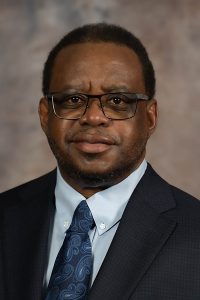Gregory Murphy Carries the Volunteer Spirit Throughout Career

Gregory V. Murphy (PhD/EECS, ’90) did not set out to be the first Black man to earn a PhD in electrical engineering at UT, and did not immediately realize what he had accomplished.
“It was not my goal to be the first, but to pursue my goal of obtaining a PhD,” said Murphy, now a professor in the Department of Electrical Engineering at Tuskegee University. “My personal goal and being the first happened to coincide.”
He was a participant in the second cohort of the college’s Minority Engineering Scholarship Program (MESP), from 1974–79. His PhD achievement is a milestone that he would have gladly seen happen earlier.
“It would have been great to have others to come before me,” he said. “I wish that there were more PhDs that look like me. I had hoped that more would have graduated since then, and I wonder why more have not.”
Murphy met his goals with valuable support from the community of his parents, relatives, friends, neighbors, church, and teachers—all who encouraged and believed in his journey.
“I also think about the impact the MESP office, with Fred Brown and James Pippin, had on my success as a graduate student,” he said. “They both provided support and a place to reflect during my studies.”
Brown, the founding director of the program, selected Murphy to participate in the MESP, and even met him and other students when they arrived at the Knoxville bus station.
“We walked with Fred Brown to campus and I was amazed at the size of the hills, since I was from West Tennessee where the landscape is flat,” said Murphy. “I remember him jokingly saying that people in East Tennessee have anatomically evolved to walk on hills.”
On campus, his new colleagues helped energize Murphy in his studies.
“It was a wonderful experience to be surrounded by a talented group of young people who were pursuing the goal of becoming engineers,” he said. “The MESP office provided a supportive environment where you could seek assistance, advice, and encouragement.”
Murphy’s roster of favorite classes includes circuits, power, digital logic, controls, and electronics. His list of favorite professors is also a long one, with fond undergraduate to graduate school memories of Asa Bishop, J.M. Bailey, J.M. Googe, Robert Bodenheimer, Jack Lawler, and Walter Green.
“The UT education refined and improved my analytical skills to become a more capable problem solver,” said Murphy. “The UT education reinforced the need to be committed and to persevere. Most importantly, my UT education enhanced my ability to think outside of the box. The cohort of graduate students that I met from around the world further reinforced the appreciation of other cultures and diversity of thought.”
This foundation added to Murphy’s ability as an effective contributor and efficient project technical leader in industry, and gave him the approach in his faculty and department head roles to understand goals, the needed results, and what success may look like for his team’s endeavors.
“My experience at UT inspired me to obtain goals beneficial for the department, students, and faculty,” he said. “This includes supporting curriculum, research, and partnerships that impact everyone. One important takeaway from UT has been the creation of a diverse team of faculty—cultures, women, and men—to do research, teach, and advise students. This is important because students need to understand that there is diversity in the technological areas they are pursuing.”
Murphy feels his greatest achievement in his previous role as department head was graduating over 70 Black students, across five cohorts, with masters’ degrees in electrical engineering and a concentration in systems engineering.
“I developed the master’s program in systems engineering in coordination with the Naval Sea Systems Command (NAVSEA) to meet their technical needs,” he said. “They needed engineers with a systems approach to work on projects.”
In addition to this educational legacy, Murphy is also proud of his sons, Jared and Jordan, who both have engineering degrees, and grandson Noah. His siblings are also successful in their chosen careers, and his nieces and nephews continue the family tradition. One niece even brought the family connection back to UT.
“I am also proud to say my niece Karmen graduated from UT in engineering and now is an OBGYN,” he said.
The Volunteer Spirit shines throughout Murphy’s career and continued impact on engineering education.